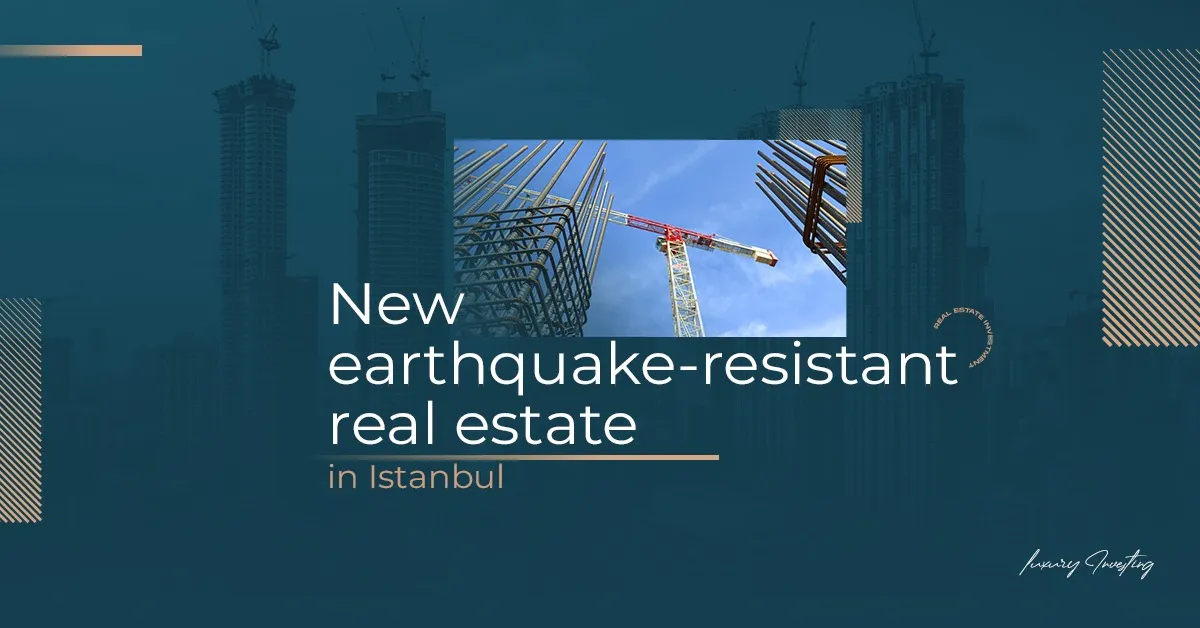
New earthquake-resistant real estate in Istanbul
Table of Contents
- What is earthquake insurance in Turkey?
- Is earthquake insurance in Turkey important?
- Does earthquake insurance in Turkey cover all buildings?
- What does earthquake insurance cover in Turkey?
- What are the papers required from the property owner to obtain earthquake insurance in Turkey?
- How much is earthquake insurance for real estate in Turkey?
One of the most important things asked by the real estate investor or who wants to buy real estate in Istanbul is the quality of the building and its resistance to earthquakes in Turkey, and we put in your hands this article in which we explain about the Disaster Prevention Law in Turkey.
In recent years, protecting buildings from earthquakes has become an important matter that must be studied and taken into consideration before starting any project or residential complex in Istanbul. Where residential complexes are built according to the conditions and controls of earthquake resistance, investigations have confirmed that the buildings that suffered losses as a result of earthquakes were due to non-compliance of these buildings with the rules of the Earthquake and Disaster Prevention Law.
Recently, the Turkish government has taken steps to raise safety standards in new buildings and modern housing and to renovate and rebuild old buildings to make them more earthquake-resistant. The Ministry of Urban Environment has announced disaster prevention plans as it issued new regulations for earthquake safety standards.
The Turkish government closely monitors buildings under construction, as all materials used in the construction of these buildings are checked, and a team from the ministry also patrols to ensure safety standards for residential and commercial buildings.
What is earthquake insurance in Turkey?
Earthquake insurance in Turkey is a compulsory insurance that protects construction costs after damage to the building as a result of natural disasters such as earthquakes, fires and collapses, and provides financial support for real estate owners to rebuild later, this is what the Turkish government introduced after the devastating 1991 earthquake that claimed many lives and left behind a lot of material and moral losses. This insurance is extracted from the Natural Disaster Insurance Corporation known as “DASK”, which is directly supervised by the Turkish Ministry of Finance.
The owner of the property pays this insurance directly upon receiving the house key so that he can obtain all the state’s services such as electricity, water, gas, communications and the Internet. This is due to the fact that all previous services cannot be used without the presence of the DASK insurance policy. After registration, the earthquake insurance payment mechanism becomes annual only with DASK institution according to a specific date. The mechanism for paying these amounts is done at a branch of Turkish banks or through the post office, or at an insurance company's office.
Is earthquake insurance in Turkey important?
The importance of the earthquake insurance law in Turkey lies in preserving the safety of buildings from demolition and their ability to resist earthquakes, which reduces the possibility of seismic damage and also contributes to reducing material costs and expenses for real estate owners as a result of natural disasters. This insurance maintained awareness among the construction companies of residential complexes of the importance of building a sound building that is resistant to disasters, in addition to increasing the awareness of residents in preserving their real estate and their rights by obtaining earthquake insurance from government agencies, and its importance also lies in determining the damages and expenses required to repair buildings after any earthquake or disaster.
Does earthquake insurance in Turkey cover all buildings?
Real estate buildings covered by earthquake insurance are residential real estate registered in the government land registry department, such as apartments, villas, residential complexes, and state-owned buildings that are granted to residents as compensation in the event of disasters, in addition to office real estate and companies registered in the land registry department. It also includes floors subject to property law, such as service facilities. and roofs.
Also, the Earthquake Insurance Law covers real estate easements and buildings that do not meet construction requirements and are classified as commercial.
On the other hand, there are buildings that are not covered by earthquake insurance, and they include buildings that are not subject to the state’s building laws in the first place, abandoned homes and offices, and buildings in rural areas that do not comply with the law, did not obtain a building permit in the first place, or received demolition notices from the government.
What does earthquake insurance cover in Turkey?
This insurance covers the expenses incurred if any of the following are damaged due to earthquakes or natural disasters:
• Foundations of real estate construction.
• The walls of the property or the garden of the property with regard to villas and independent houses.
• Ceiling.
• Flooring.
• Corridors inside buildings.
• Stairs and electric lifts.
On the other hand, this insurance does not provide any compensation for the following expenses:
• Home and office furniture.
• Merchandise in shops.
• Rental compensation.
• Death cases.
• Unemployment.
• Psychological and physical harm.
• Transportation expenses to a new home or office.
• Expenses of removal and removal of rubble.
What are the papers required from the property owner to obtain earthquake insurance in Turkey?
• A copy of the identity of the owner of the property.
• Tax Number.
• Receipt of payment of earthquake insurance fees.
• A copy of the tapu, which contains sufficient information about the property.
• The address of the property in detail.
How much is earthquake insurance for real estate in Turkey?
The insurance value varies according to the following property specifications:
• Age of construction.
• The area of the property and the number of rooms.
• The location of the property.
For more information, you can contact us.
Frequently asked questions
Earthquake insurance in Turkey is compulsory insurance that protects construction costs after damage to the building as a result of natural disasters such as earthquakes, fires and collapses, and provides financial support to real estate owners for later reconstruction. This insurance is extracted from the Natural Disaster Insurance Corporation known as “DASK”, which is directly supervised by the Turkish Ministry of Finance.
Real estate buildings covered by earthquake insurance are residential real estate registered in the government land registry department, such as apartments, villas, residential complexes, and state-owned buildings that are granted to residents as compensation in the event of disasters, in addition to office real estate and companies registered in the land registry department. It also includes floors subject to property law, such as service facilities. and roofs.
Also, the Earthquake Insurance Law covers real estate easements and buildings that do not meet construction requirements and are classified as commercial.
A copy of the identity of the owner of the property.
Tax Number.
Receipt of payment of earthquake insurance fees.
A copy of the tapu, which contains sufficient information about the property.
The address of the property in detail.
Maltepe is considered relatively safe from earthquakes, located on the southern part of the Anatolian side and classified as a low to moderate-risk earthquake zone. Another safe area on the Anatolian side of Istanbul is the Cekmekoy district.
Newer buildings in Istanbul are generally more earthquake-resistant as they are constructed to meet current seismic codes and standards. In contrast, many buildings in older parts of the city were built before these modern seismic regulations were implemented.
Maintenance costs vary depending on the type of property and the residential complex. They typically include cleaning costs, security, gardening, and shared facilities such as swimming pools or sports clubs.








